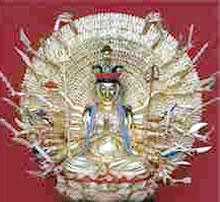Guanyin (Kwan-yin)
or Guanshiyin, is the Chinese literary translation of the Avalokitesvara,
meaning the bodhisattva "observing the sounds of the world."
Of all the Buddhist deities, Guanyin is perhaps the most popular among
Chinese.
 |
| The
1000-hand Guanyin |
The Chinese
came to know Avalokitesvara as Guanyin when Buddhism was introduced into
China around 200-589 A.D. Representations of Guanyin prior to the Song
Dynasty (960-1126) were masculine in appearance in accordance with the
Buddhist tradition. By and by, Guanyin's image became feminized, represented
as a middle-aged fair lady in a white robe. The transformation marked
the Sinification of Avalokitesvara by the Chinese who believed in the
Lotus Sutra, which gives Avalokitesvara the ability to assume innumerable
forms. Among them are the representations of a lady in white robe and
a bodhisattva with a thousand hands. The Chinese might have believed that
a feminine image would best embody Avalokitesvara's compassionate desire
to listen to people's supplications and came to their rescue at all cost.
"This desire and ability to help all without distinction is due to Avalokitesvara's
great compassion, indeed he is seen as the very embodiment of the Buddha's
compassion." (A. On, In China. J. Blofield, Bodhisatva of Compassion.
Boston, 1988)
Guanyin
Who Gives Up Her Babies to Others
One legend
deals with one of the many forms of Guanyin, that is the Song Zi Guanyin
(Guanyin Who Gives Her Own Babies to Others). Song Zi Guanyin had been
a shepherdess known for her preeminent dancing skills. One day, the king
had a party to entertain his five hundred warriors who had helped in his
victorious battle against his rival. He invited the shepherdess to dance
for them despite her pregnancy. She had to obey the king. She meant to
perform a dance or two and came back home, but the half drunken warriors
insisted that she dance with them. In the turmoil, she had a miscarriage,
which dealt her a fatal emotional blow.
After her death,
she became the wife of Hades. To compensate for the pain she had suffered
in life, she gave birth to five hundred children. Even though, she felt
no solace. Urged by her desire to retaliate, each night she would transform
herself into a ferocious ghost and came to this world to prey on children.
The world was seized with terror.
Nevertheless, she
found one of her five children missing as she came back from her killing
mission one night. She searched high and low but to no avail. Her misery
was boundless. As she was about to collapse when Buddha appeared before
her. Buddha told her that he hid her child in order to save her soul.
"You have five
hundred children and yet you feel so painful when one is missing. You
know that earthlings had only one or two in each family. How much pain
would they suffer when they lose one?" Buddha asked her.
The ghost realized
her sin and would like atone for it. She gave all her five hundred children
to those earthlings who had reproduction problems and prayed for one.
This story
is another example of a human being becoming a gui or ghost that could
be transformed into a shen or spirit.
Story
retold by Haiwang Yuan, ©2003
Last updated: October 9, 2003 |